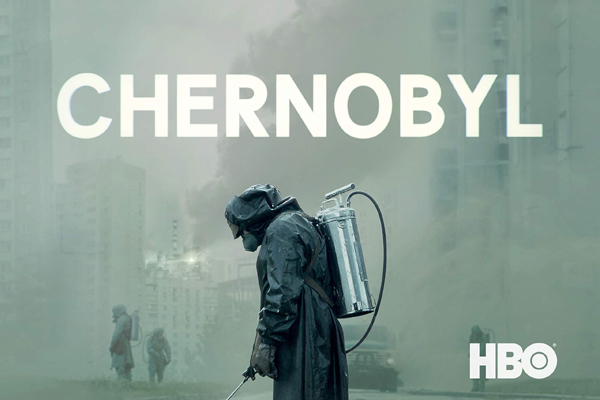Show: “Chernobyl”, a five-part HBO miniseries; Cast: Stellan Skarsgard, Emily Watson and Paul Ritter; Director: Johan Renck; Rating; *** ½ (3 and a half stars)
It’s easy to see where the superlative reviews of this five-part series are coming from… and where they are going. The fear of another impending nuclear disaster on the monstrous scale of Chernobyl, or to take the analogy to a damning extreme, we are living in a world waiting to do a Chernobyl on civilization.
HBO’s “Chernobyl” is a timely warning, and in many parts, devastating in the details of the damage and destruction that destroyed nearly a million lives in Russia.
From the beginning of the series, as the clouds of calamity kick in almost immediately, we see director Johan Renck and his writer Craig Mazin piling up their desks with reams of research. The Chernobyl disaster renders itself to innumerable discussions and exposes. And for the writer and director to plod and wade through it all without serving up an over-detailed, unhurried drama that builds up slowly, but not so slowly as to let audiences’ interests flag, is something of a miraculous achievement.
And yet I found some of the rigorous research that has gone into this commendable expose to obstruct a free-flowing narrative. The fluidity in the temperament is tampered by preserving the sanctity of ‘What Must Have Been’. I can fully understand the need to be scrupulous to a human catastrophe on a level that defies all rationale. We must respect this project’s pursuit of the truth.
The sense of dread and doom hangs over Chernobyl to its fatal finale. There is no escaping the sense of calamity that underlines every move. And radiation is no fodder for drama. Director Johan Renck ensures we keep staring in shock as the horrors of the event unfold.
There are bouts of incredible moments, bravely punctuating and piercing the bleak and deathly calm that shrouds the presentation. My favourite act of courage is when coal miners are roped in to dig a tunnel to contain the toxic leakage. Working airlessly stark naked for weeks in the claustrophobic tunnel knowing that death awaits at the end, is more than just an act of self-sacrifice.
It reflects on the desperate times that the country, its bureaucracy and its work-force must have gone through as people fell prey to political devastation on an unimaginable scale.
“Chernobyl” doesn’t waste too much time on statistics. Instead, it recreates events from the worst man-made disaster to illustrate the two sides of human nature: humanity and inhumanity, the latter mostly attributable to a blinkered, blinded and insensitive bureaucracy that wanted to cover up the ghastly tragedy rather than heal wounds or comfort a country of suddenly dying civilians.
This is a series that no one should miss.


































